Employee Training & Development in UK Retail: An ASDA Case Study
VerifiedAdded on 2023/06/10
|6
|1479
|158
Report
AI Summary
This report explores the impact of training and development sessions on employee performance within the UK retail industry, focusing on a case study of ASDA. The study aims to understand the concept of training and development, assess different strategies implemented in the retail sector, and ascertain the relationship between training sessions and employee performance. It employs a qualitative research method with an inductive approach, utilizing both primary and secondary data collection methods. Thematic analysis is used for interpreting findings, and the research considers reliability, validity, limitations, and ethical considerations. The report concludes by recommending ways for ASDA to improve employee performance through effective training sessions, highlighting the positive relationship between training, employee motivation, and job satisfaction.
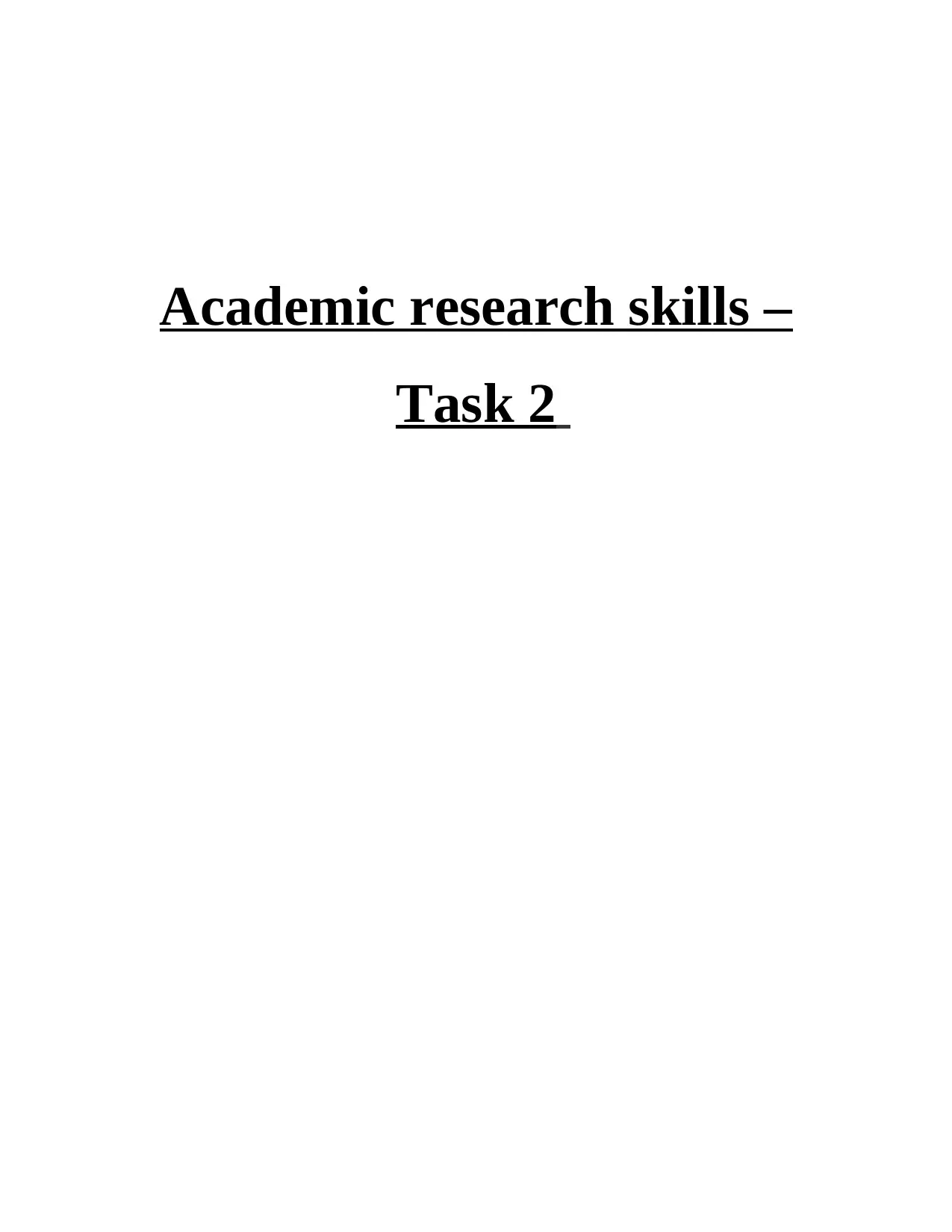
Academic research skills –
Task 2
Task 2
Paraphrase This Document
Need a fresh take? Get an instant paraphrase of this document with our AI Paraphraser
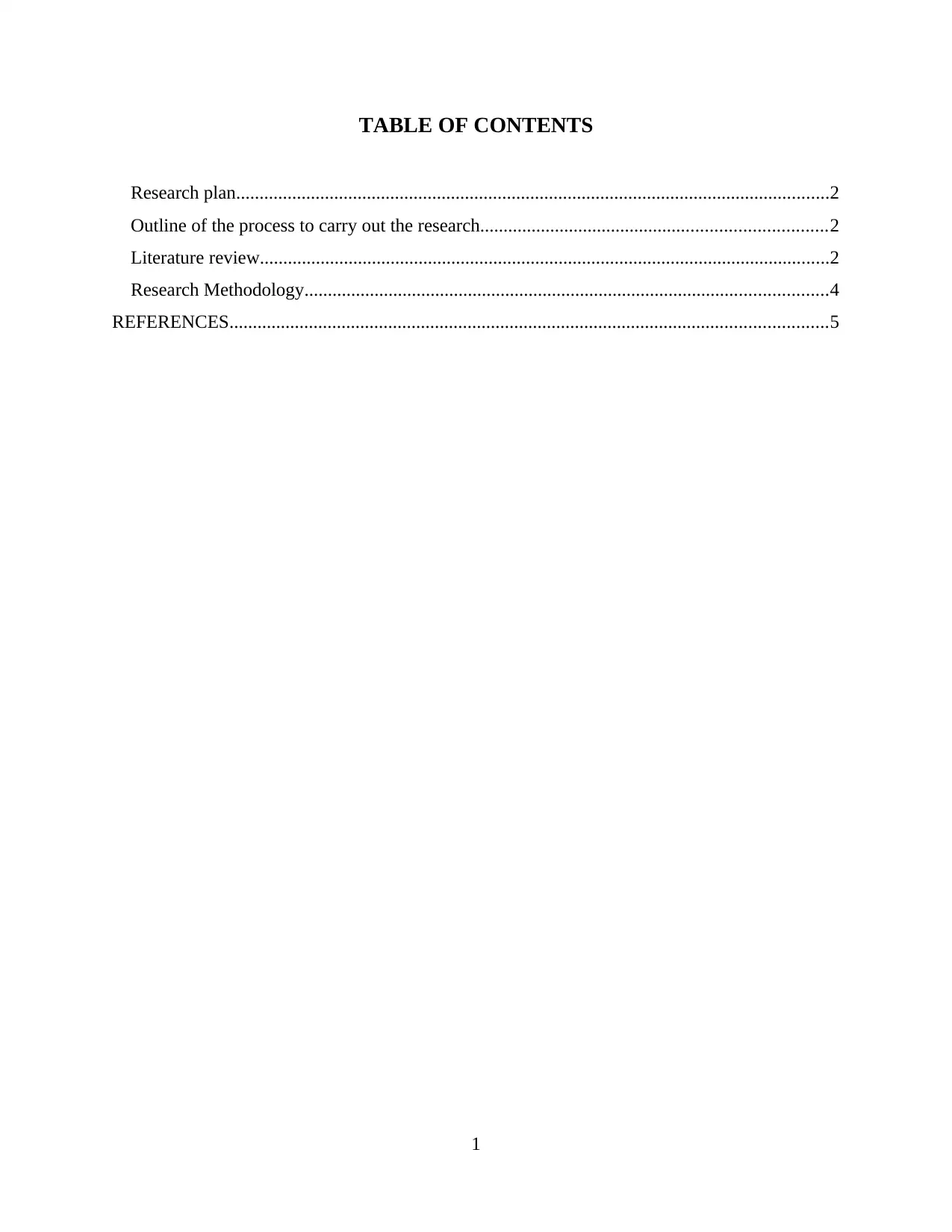
TABLE OF CONTENTS
Research plan...............................................................................................................................2
Outline of the process to carry out the research..........................................................................2
Literature review..........................................................................................................................2
Research Methodology................................................................................................................4
REFERENCES................................................................................................................................5
1
Research plan...............................................................................................................................2
Outline of the process to carry out the research..........................................................................2
Literature review..........................................................................................................................2
Research Methodology................................................................................................................4
REFERENCES................................................................................................................................5
1
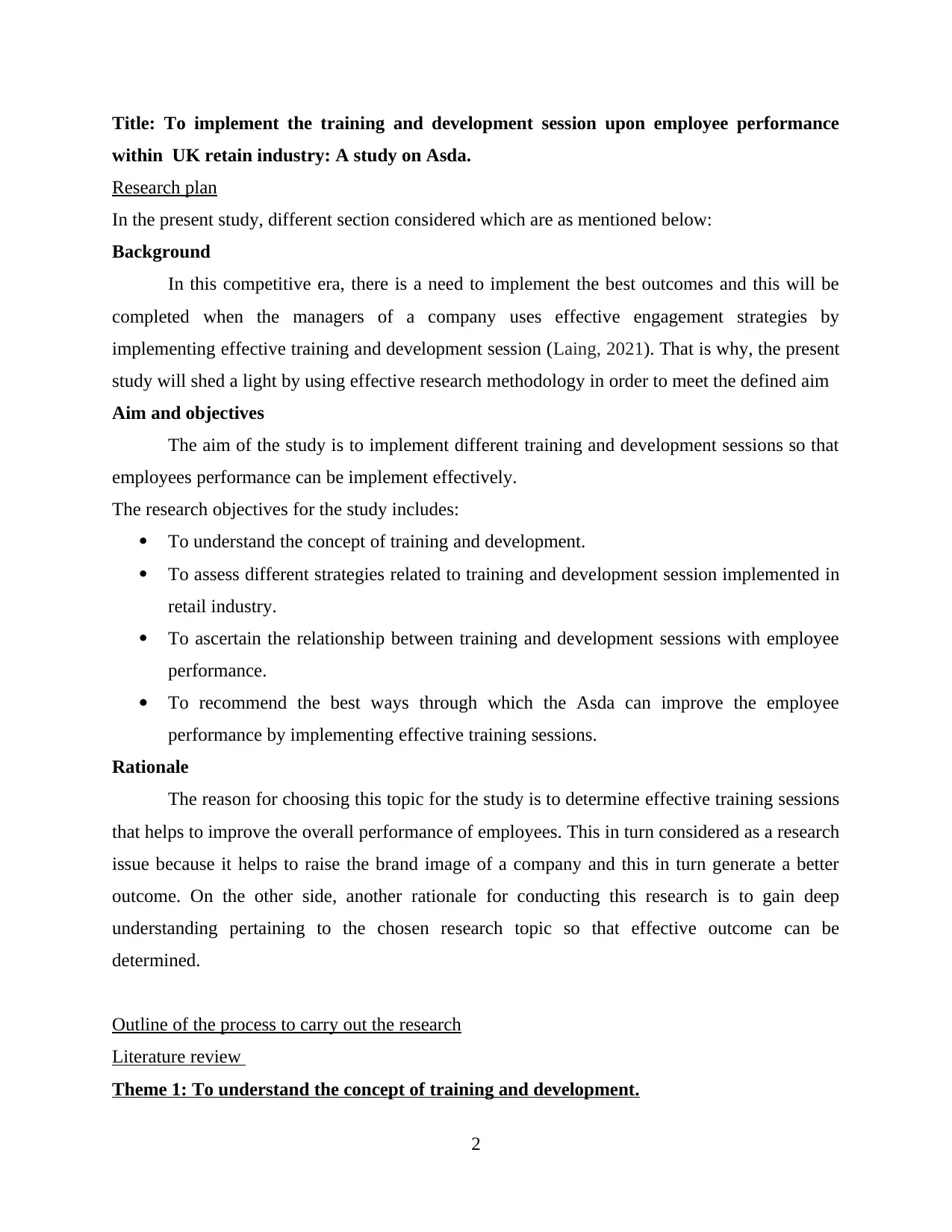
Title: To implement the training and development session upon employee performance
within UK retain industry: A study on Asda.
Research plan
In the present study, different section considered which are as mentioned below:
Background
In this competitive era, there is a need to implement the best outcomes and this will be
completed when the managers of a company uses effective engagement strategies by
implementing effective training and development session (Laing, 2021). That is why, the present
study will shed a light by using effective research methodology in order to meet the defined aim
Aim and objectives
The aim of the study is to implement different training and development sessions so that
employees performance can be implement effectively.
The research objectives for the study includes:
To understand the concept of training and development.
To assess different strategies related to training and development session implemented in
retail industry.
To ascertain the relationship between training and development sessions with employee
performance.
To recommend the best ways through which the Asda can improve the employee
performance by implementing effective training sessions.
Rationale
The reason for choosing this topic for the study is to determine effective training sessions
that helps to improve the overall performance of employees. This in turn considered as a research
issue because it helps to raise the brand image of a company and this in turn generate a better
outcome. On the other side, another rationale for conducting this research is to gain deep
understanding pertaining to the chosen research topic so that effective outcome can be
determined.
Outline of the process to carry out the research
Literature review
Theme 1: To understand the concept of training and development.
2
within UK retain industry: A study on Asda.
Research plan
In the present study, different section considered which are as mentioned below:
Background
In this competitive era, there is a need to implement the best outcomes and this will be
completed when the managers of a company uses effective engagement strategies by
implementing effective training and development session (Laing, 2021). That is why, the present
study will shed a light by using effective research methodology in order to meet the defined aim
Aim and objectives
The aim of the study is to implement different training and development sessions so that
employees performance can be implement effectively.
The research objectives for the study includes:
To understand the concept of training and development.
To assess different strategies related to training and development session implemented in
retail industry.
To ascertain the relationship between training and development sessions with employee
performance.
To recommend the best ways through which the Asda can improve the employee
performance by implementing effective training sessions.
Rationale
The reason for choosing this topic for the study is to determine effective training sessions
that helps to improve the overall performance of employees. This in turn considered as a research
issue because it helps to raise the brand image of a company and this in turn generate a better
outcome. On the other side, another rationale for conducting this research is to gain deep
understanding pertaining to the chosen research topic so that effective outcome can be
determined.
Outline of the process to carry out the research
Literature review
Theme 1: To understand the concept of training and development.
2
⊘ This is a preview!⊘
Do you want full access?
Subscribe today to unlock all pages.

Trusted by 1+ million students worldwide
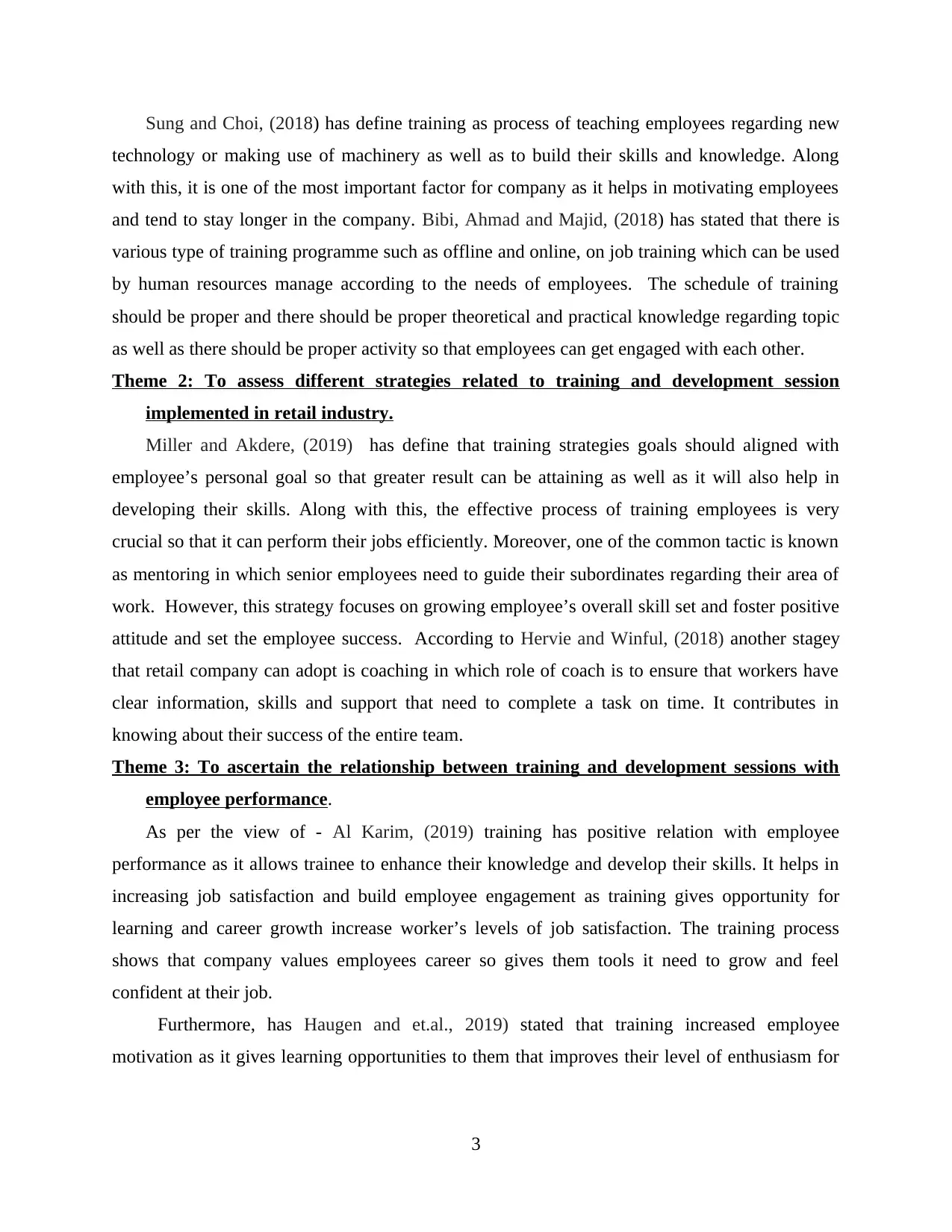
Sung and Choi, (2018) has define training as process of teaching employees regarding new
technology or making use of machinery as well as to build their skills and knowledge. Along
with this, it is one of the most important factor for company as it helps in motivating employees
and tend to stay longer in the company. Bibi, Ahmad and Majid, (2018) has stated that there is
various type of training programme such as offline and online, on job training which can be used
by human resources manage according to the needs of employees. The schedule of training
should be proper and there should be proper theoretical and practical knowledge regarding topic
as well as there should be proper activity so that employees can get engaged with each other.
Theme 2: To assess different strategies related to training and development session
implemented in retail industry.
Miller and Akdere, (2019) has define that training strategies goals should aligned with
employee’s personal goal so that greater result can be attaining as well as it will also help in
developing their skills. Along with this, the effective process of training employees is very
crucial so that it can perform their jobs efficiently. Moreover, one of the common tactic is known
as mentoring in which senior employees need to guide their subordinates regarding their area of
work. However, this strategy focuses on growing employee’s overall skill set and foster positive
attitude and set the employee success. According to Hervie and Winful, (2018) another stagey
that retail company can adopt is coaching in which role of coach is to ensure that workers have
clear information, skills and support that need to complete a task on time. It contributes in
knowing about their success of the entire team.
Theme 3: To ascertain the relationship between training and development sessions with
employee performance.
As per the view of - Al Karim, (2019) training has positive relation with employee
performance as it allows trainee to enhance their knowledge and develop their skills. It helps in
increasing job satisfaction and build employee engagement as training gives opportunity for
learning and career growth increase worker’s levels of job satisfaction. The training process
shows that company values employees career so gives them tools it need to grow and feel
confident at their job.
Furthermore, has Haugen and et.al., 2019) stated that training increased employee
motivation as it gives learning opportunities to them that improves their level of enthusiasm for
3
technology or making use of machinery as well as to build their skills and knowledge. Along
with this, it is one of the most important factor for company as it helps in motivating employees
and tend to stay longer in the company. Bibi, Ahmad and Majid, (2018) has stated that there is
various type of training programme such as offline and online, on job training which can be used
by human resources manage according to the needs of employees. The schedule of training
should be proper and there should be proper theoretical and practical knowledge regarding topic
as well as there should be proper activity so that employees can get engaged with each other.
Theme 2: To assess different strategies related to training and development session
implemented in retail industry.
Miller and Akdere, (2019) has define that training strategies goals should aligned with
employee’s personal goal so that greater result can be attaining as well as it will also help in
developing their skills. Along with this, the effective process of training employees is very
crucial so that it can perform their jobs efficiently. Moreover, one of the common tactic is known
as mentoring in which senior employees need to guide their subordinates regarding their area of
work. However, this strategy focuses on growing employee’s overall skill set and foster positive
attitude and set the employee success. According to Hervie and Winful, (2018) another stagey
that retail company can adopt is coaching in which role of coach is to ensure that workers have
clear information, skills and support that need to complete a task on time. It contributes in
knowing about their success of the entire team.
Theme 3: To ascertain the relationship between training and development sessions with
employee performance.
As per the view of - Al Karim, (2019) training has positive relation with employee
performance as it allows trainee to enhance their knowledge and develop their skills. It helps in
increasing job satisfaction and build employee engagement as training gives opportunity for
learning and career growth increase worker’s levels of job satisfaction. The training process
shows that company values employees career so gives them tools it need to grow and feel
confident at their job.
Furthermore, has Haugen and et.al., 2019) stated that training increased employee
motivation as it gives learning opportunities to them that improves their level of enthusiasm for
3
Paraphrase This Document
Need a fresh take? Get an instant paraphrase of this document with our AI Paraphraser
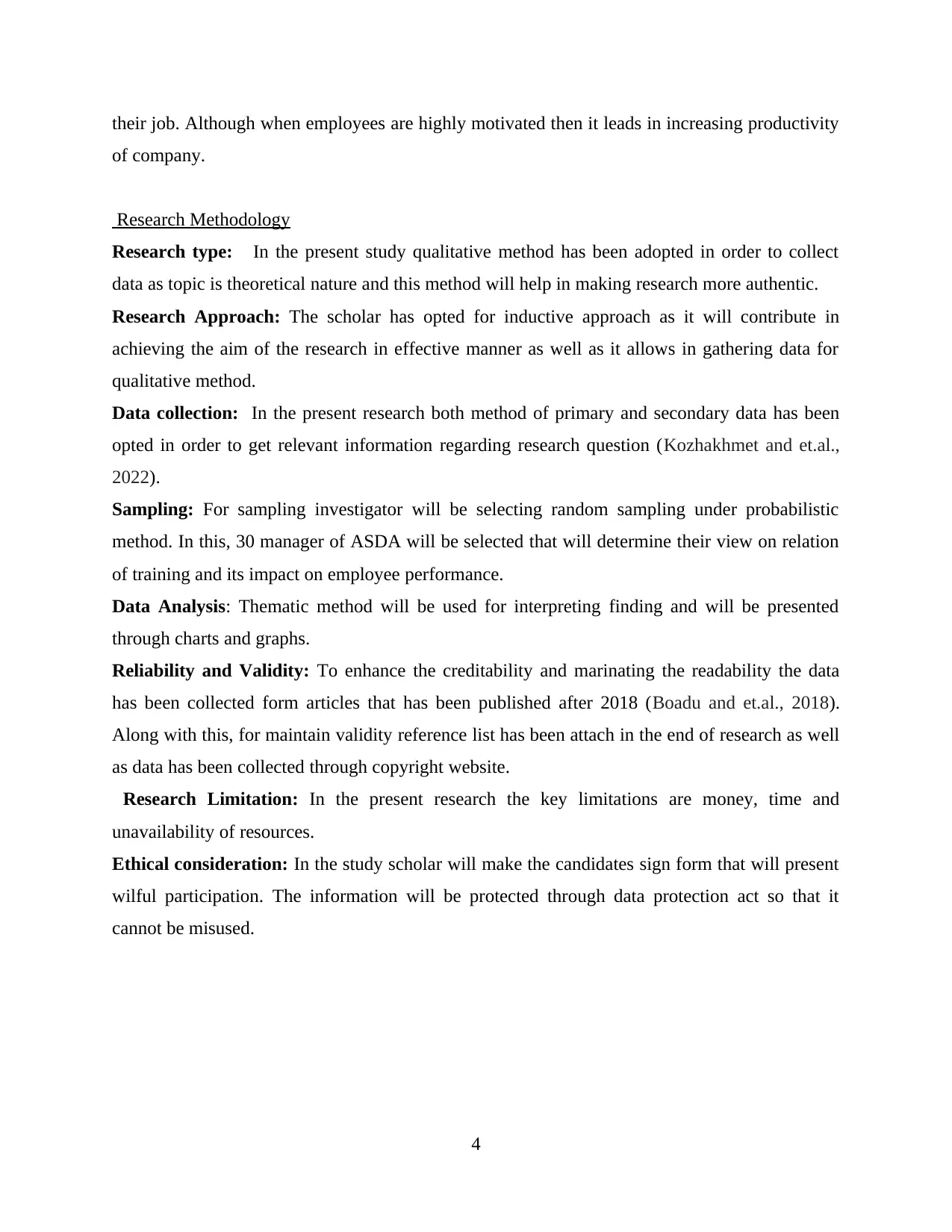
their job. Although when employees are highly motivated then it leads in increasing productivity
of company.
Research Methodology
Research type: In the present study qualitative method has been adopted in order to collect
data as topic is theoretical nature and this method will help in making research more authentic.
Research Approach: The scholar has opted for inductive approach as it will contribute in
achieving the aim of the research in effective manner as well as it allows in gathering data for
qualitative method.
Data collection: In the present research both method of primary and secondary data has been
opted in order to get relevant information regarding research question (Kozhakhmet and et.al.,
2022).
Sampling: For sampling investigator will be selecting random sampling under probabilistic
method. In this, 30 manager of ASDA will be selected that will determine their view on relation
of training and its impact on employee performance.
Data Analysis: Thematic method will be used for interpreting finding and will be presented
through charts and graphs.
Reliability and Validity: To enhance the creditability and marinating the readability the data
has been collected form articles that has been published after 2018 (Boadu and et.al., 2018).
Along with this, for maintain validity reference list has been attach in the end of research as well
as data has been collected through copyright website.
Research Limitation: In the present research the key limitations are money, time and
unavailability of resources.
Ethical consideration: In the study scholar will make the candidates sign form that will present
wilful participation. The information will be protected through data protection act so that it
cannot be misused.
4
of company.
Research Methodology
Research type: In the present study qualitative method has been adopted in order to collect
data as topic is theoretical nature and this method will help in making research more authentic.
Research Approach: The scholar has opted for inductive approach as it will contribute in
achieving the aim of the research in effective manner as well as it allows in gathering data for
qualitative method.
Data collection: In the present research both method of primary and secondary data has been
opted in order to get relevant information regarding research question (Kozhakhmet and et.al.,
2022).
Sampling: For sampling investigator will be selecting random sampling under probabilistic
method. In this, 30 manager of ASDA will be selected that will determine their view on relation
of training and its impact on employee performance.
Data Analysis: Thematic method will be used for interpreting finding and will be presented
through charts and graphs.
Reliability and Validity: To enhance the creditability and marinating the readability the data
has been collected form articles that has been published after 2018 (Boadu and et.al., 2018).
Along with this, for maintain validity reference list has been attach in the end of research as well
as data has been collected through copyright website.
Research Limitation: In the present research the key limitations are money, time and
unavailability of resources.
Ethical consideration: In the study scholar will make the candidates sign form that will present
wilful participation. The information will be protected through data protection act so that it
cannot be misused.
4
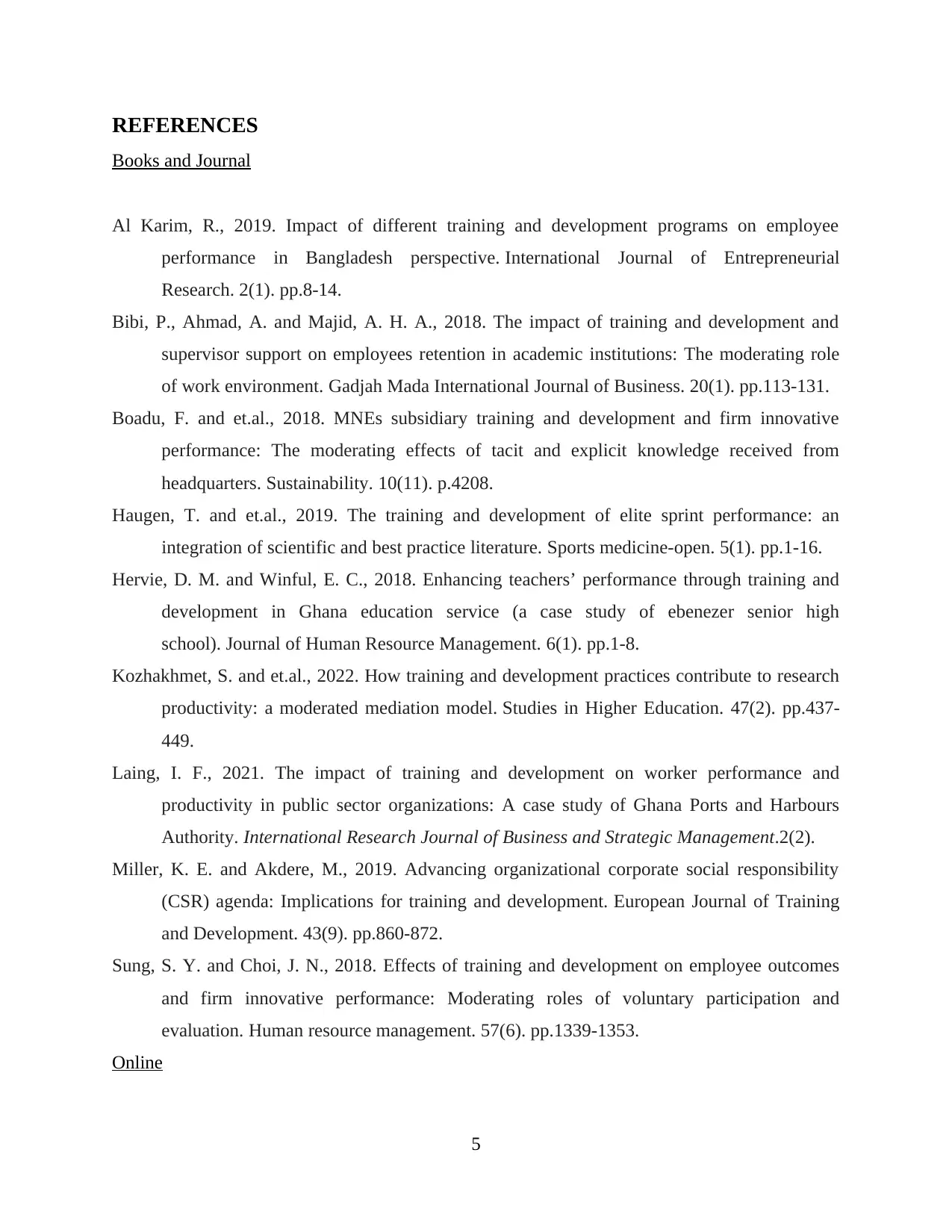
REFERENCES
Books and Journal
Al Karim, R., 2019. Impact of different training and development programs on employee
performance in Bangladesh perspective. International Journal of Entrepreneurial
Research. 2(1). pp.8-14.
Bibi, P., Ahmad, A. and Majid, A. H. A., 2018. The impact of training and development and
supervisor support on employees retention in academic institutions: The moderating role
of work environment. Gadjah Mada International Journal of Business. 20(1). pp.113-131.
Boadu, F. and et.al., 2018. MNEs subsidiary training and development and firm innovative
performance: The moderating effects of tacit and explicit knowledge received from
headquarters. Sustainability. 10(11). p.4208.
Haugen, T. and et.al., 2019. The training and development of elite sprint performance: an
integration of scientific and best practice literature. Sports medicine-open. 5(1). pp.1-16.
Hervie, D. M. and Winful, E. C., 2018. Enhancing teachers’ performance through training and
development in Ghana education service (a case study of ebenezer senior high
school). Journal of Human Resource Management. 6(1). pp.1-8.
Kozhakhmet, S. and et.al., 2022. How training and development practices contribute to research
productivity: a moderated mediation model. Studies in Higher Education. 47(2). pp.437-
449.
Laing, I. F., 2021. The impact of training and development on worker performance and
productivity in public sector organizations: A case study of Ghana Ports and Harbours
Authority. International Research Journal of Business and Strategic Management.2(2).
Miller, K. E. and Akdere, M., 2019. Advancing organizational corporate social responsibility
(CSR) agenda: Implications for training and development. European Journal of Training
and Development. 43(9). pp.860-872.
Sung, S. Y. and Choi, J. N., 2018. Effects of training and development on employee outcomes
and firm innovative performance: Moderating roles of voluntary participation and
evaluation. Human resource management. 57(6). pp.1339-1353.
Online
5
Books and Journal
Al Karim, R., 2019. Impact of different training and development programs on employee
performance in Bangladesh perspective. International Journal of Entrepreneurial
Research. 2(1). pp.8-14.
Bibi, P., Ahmad, A. and Majid, A. H. A., 2018. The impact of training and development and
supervisor support on employees retention in academic institutions: The moderating role
of work environment. Gadjah Mada International Journal of Business. 20(1). pp.113-131.
Boadu, F. and et.al., 2018. MNEs subsidiary training and development and firm innovative
performance: The moderating effects of tacit and explicit knowledge received from
headquarters. Sustainability. 10(11). p.4208.
Haugen, T. and et.al., 2019. The training and development of elite sprint performance: an
integration of scientific and best practice literature. Sports medicine-open. 5(1). pp.1-16.
Hervie, D. M. and Winful, E. C., 2018. Enhancing teachers’ performance through training and
development in Ghana education service (a case study of ebenezer senior high
school). Journal of Human Resource Management. 6(1). pp.1-8.
Kozhakhmet, S. and et.al., 2022. How training and development practices contribute to research
productivity: a moderated mediation model. Studies in Higher Education. 47(2). pp.437-
449.
Laing, I. F., 2021. The impact of training and development on worker performance and
productivity in public sector organizations: A case study of Ghana Ports and Harbours
Authority. International Research Journal of Business and Strategic Management.2(2).
Miller, K. E. and Akdere, M., 2019. Advancing organizational corporate social responsibility
(CSR) agenda: Implications for training and development. European Journal of Training
and Development. 43(9). pp.860-872.
Sung, S. Y. and Choi, J. N., 2018. Effects of training and development on employee outcomes
and firm innovative performance: Moderating roles of voluntary participation and
evaluation. Human resource management. 57(6). pp.1339-1353.
Online
5
⊘ This is a preview!⊘
Do you want full access?
Subscribe today to unlock all pages.

Trusted by 1+ million students worldwide
1 out of 6
Related Documents
Your All-in-One AI-Powered Toolkit for Academic Success.
+13062052269
info@desklib.com
Available 24*7 on WhatsApp / Email
![[object Object]](/_next/static/media/star-bottom.7253800d.svg)
Unlock your academic potential
Copyright © 2020–2026 A2Z Services. All Rights Reserved. Developed and managed by ZUCOL.




